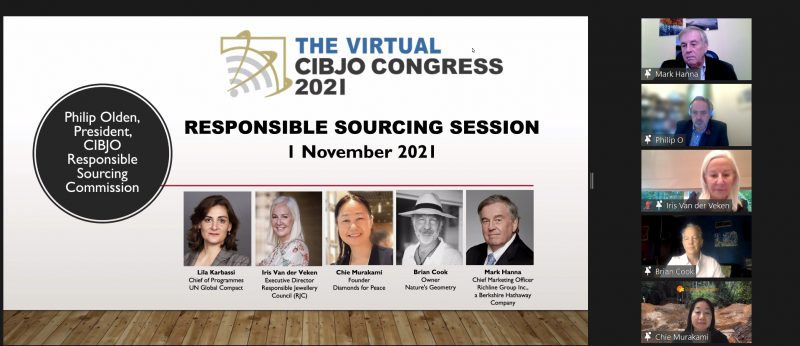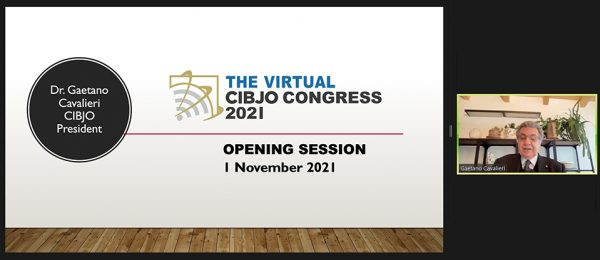The 2021 Virtual CIBJO Congress gets underway, highlighting jewellery industry’s rolein society and the environment

NOVEMBER 2, 2021
For the first time in its 95-year history, CIBJO, the World Jewellery Confederation, has launched its annual congress online rather than in a physical location, with an Opening Ceremony followed by a session of the CIBJO Responsible Sourcing Commission, during which a strong emphasis was placed on the jewellery industry’s obligations to society and the environment. The Opening Session took place on November 1, 2021.
“In congresses gone by, I have looked out over a crowded conference hall or auditorium when I said these words of welcome,” said CIBJO President Gaetano Cavalieri, greeting the congress delegates. “Today, like all of you, I am seated at my desk looking at my computer, just as I have done almost each day for the past 20 months.”
The period of the coronavirus has proven to be an inflection point for the industry, the CIBJO President stated. “There are moments in the human experience where we all realise that it will be possible to define life before the event differently to life as it is after the event. The COVID-19 pandemic is one of those,” he said.
“Do not misunderstand me,” he continued. “I do not believe that all-virtual congresses, where we gather while remaining isolated in our homes or offices, are our destiny from now on. I am confident that in the not-too-distant future we will be able to set aside most, if not all of the restrictions we now live with. Indeed, there is a very good chance that the next CIBJO Congress will be in-person rather than exclusively online.”
“But the tools, modus operandi and methods that we have adopted, initially as coping mechanisms, have changed the way we live and do business. In many respects they are more efficient, more effective and more able to deliver immediate results than those we used before the crisis. Now that we know how to use them, there is no going back,” Dr. Cavalieri said.
For an organisation like CIBJO, he stated, which brings together jewellery, gemstone and watch associations and companies from around the world, the adoption of online and digital technologies led to a period of increased activity, and a level of productivity and achievement that most probably is greater than at any time in the organisation’s history.

CIBJO President Gaetano Cavalieri greeting congress delegates.

Keynote speaker Patrick Lötscher, Head of the Watch Industry Standards Department at the Federation of the Swiss Watch Industry FH.
Delivering the keynote address during the Opening Ceremony was Patrick Lötscher, Head of the Watch Industry Standards Department at the Federation of the Swiss Watch Industry FH, which brings under its umbrella many of the world’s most famous watch brands.
A new member of CIBJO, the Swiss organisation is at the vanguard of a process to unite the watch and jewellery sectors within the confederation. The two industries use many of the same raw materials and share supply lines and retail distribution outlets.
Mr. Lötscher spoke of the Switzerland’s watch industry’s struggle against counterfeiters, who in 2019 sold considerably more fake Swiss-brand watches that the 20.7 million genuine Swiss-brand watches that were sold that same year, costing the sector billions of dollars and more than 3,000 jobs.
The Responsible Sourcing Commission’s session was moderated by the body’s President, Philip Olden, who asked his panel of guests if enough was being done by the industry on the subject of responsible sourcing, and if not what else should be done.
Opening the session, Mr. Olden mentioned that CIBJO’s Responsible Sourcing Commission’s Blue Book was the most downloaded of all such documents since the start of the pandemic, and reported that in April 2021 CIBJO launched an online Responsible Sourcing Toolkit, “which will enable members of the industry to do due diligence on their supply chains.”
The Responsible Sourcing Toolkit can be downloaded from the CIBJO website free of charge, by CLICKING HERE.
Among the panellists was Lila Karbassi, Chief of Programmes at the UN Global Compact, which unites some 14,000 firms and organisations from a wide range of industries, working to implement the Sustainable Development Goals (SDGs).

Lila Karbassi, Chief of Programmes at the UN Global Compact, in discussion with Philip Olden, President of CIBJO’s Responsible Sourcing Commission.
Speaking to the CIBJO delegates, she called on the jewellery industry to do its part in the campaign against climate change.
“See if your targets align with science,” she stated. “By 2030 you need to reduce emissions by almost half, and by 2050 significantly more. We look forward to validating company results, and we hope many firms from the jewellery industry will join us and create a momentum for the industry overall to be on track regarding climate change.”
Panellist Iris Van der Veken, Executive Director of the Responsible Jewellery Council, described the jewellery industry as being at a “tipping point.”
“We have to get everyone on this journey,” she stated. “How do we bring all members of the supply chain along? This is the challenge. We need to step up a gear and show collectively the good impact of the business.”
Panellist Chie Murakami, the founder of Diamonds for Peace, an NGO based in Japan, said that the commitment to responsible sourcing is largely “a Western thing, which needs to be spread to other parts of the world”. She mentioned visits to jewellery stores in Tokyo where no members of sales staff could provide firm answers on the issue of the sourcing of the jewellery.
She also spoke about diamond smuggling in Liberia, where her organisation is active. “The government does not have the resources to monitor this sufficiently,” she said. “It patrols mines looking for illegal activities, with inspectors that often are unpaid volunteers. The government needs more resources.”
Panellist Mark Hanna, Chief Marketing Officer at the Richline Group, which is part of Warren Buffet’s Berkshire Hathaway corporation, said that today, more than ever before, “we need to pay attention to the 3Cs: climate, carbon and circularity.”
“All firms should have a social purpose,” he said. “We need a strong and planned way of dealing with this. Harmonization is critical and I believe there is a will across the industry to work together, so that both large and small firms can share information.”
Mr. Hannah said that the use of recycled materials is important to the issue of sustainability. “There’s nothing more recyclable than gold but any product that reduces waste and uses ecologically friendly materials is good for the world and the industry,” he stated.
Brian Cook, the owner of Nature’s Geometry, who also was a panellist, said the jewellery industry is now more attuned to consumers, “because they have the buying power to make us listen.”
“Consumers want to see real action and transparency,” he said. “They want to know what is really going on.”
The jewellery sector has capacity to be an effective leader,” Mr. Cook added. “We transcend religion, race and culture and that makes us a model for other trades. It gives us the opportunity to show we are doing good for the planet. We need to find a way to harmonise our efforts.”
“Multilateralism, which in our community means coordinating the activities of the various sectors and the different national associations and companies, is essential to progress being made in the jewellery and watch industries, particularly where it comes to fulfilling our obligations to support and protect society and the environment,” said CIBJO President Gaetano Cavalieri, concluding the session. “What we have demonstrated today is that everyone is provided an opportunity to speak their mind, but we then have to find common ground and move to action.”
